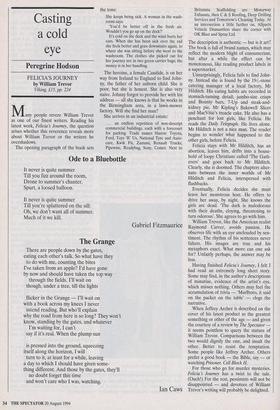Casting a cold eye
Peregrine Hodson
FELICIA'S JOURNEY by William Trevor Viking, £15, pp. 224 M any people revere William Trevor as one of our finest writers. Reading his latest work, Felicia's Journey, the question arises whether this reverence reveals more about William Trevor or the writers he overshadows.
The opening paragraph of the book sets the tone:
She keeps being sick. A woman in the wash- room says: `You'd be better off in the fresh air. Wouldn't you go up on the deck?'
It's cold on the deck and the wind hurts her ears. When she has been sick over the rail she feels better and goes downstairs again, to where she was sitting before she went to the washroom. The clothes she picked out for her journey are in two green carrier bags; the money is in her handbag.
The heroine, a female Candide, is on her way from Ireland to England to find John- ny, the father of her unborn child. She is poor, but she is honest. She is also very naive. Johnny forgot to provide her with his address — all she knows is that he works in the Birmingham area, in a lawn-mower factory. Will she find her man?
She arrives in an industrial estate:
. . . an endless repetition of non-descript commercial buildings, each with a forecourt for parking. Trade names blazon: Toyota, Ford, Toys `12' Us, National Tyre and Auto- care, Kwik Fit, Zanussi, Renault Trucks, Pipewise, Readybag, Sony, Comet. Next to Britannia Scaffolding are Motorway Exhausts, then C & S Roofing, Deep Drilling Services and Tomorrow's Cleaning Today. At an intersection a little further on, Allparts Vehicle Dismantlers share the corner with OK Blast and Spray Ltd.
The description is authentic — but is it art? The book is full of brand names, which may reflect the modern blight of consumerism, but after a while the effect can be monotonous, like reading product labels in a supermarket.
Unsurprisingly, Felicia fails to find John- ny. Instead she is found by the 19i/2-stone catering manager of a local factory, Mr Hilditch. His eating habits are recorded in stomach-turning detail; jumbo-size crisps and Bounty bars, 7-Up and steak-and- kidney pie, Mr Kipling's Bakewell Slices and MacVitie's treacle cake. He also has a penchant for lost girls, like Felicia. He reads the Daily Telegraph. He lives alone. Mr Hilditch is not a nice man. The reader begins to wonder what happened to the other girls, before Felicia.
Felicia stays with Mr Hilditch, has an abortion, leaves him, drifts into a house- hold of loopy Ctiristians called 'The Gath- erers' and goes back to Mr Hilditch. Clearly, she is doomed. The chapters alter- nate between the inner worlds of Mr Hilditch and Felicia, interspersed with flashbacks.
Eventually, Felicia decides she must leave her monstrous host. He offers to drive her away, by night. She knows the girls are dead. 'The dark is malodorous with their deaths, cloying, threatening to turn odorous'. She agrees to go with him.
William Trevor, like the American realist Raymond Carver, avoids passion. He observes life with an eye unclouded by sen- timent. The rhythm of his sentences never falters. His images are true and his metaphors exact. What more can one ask for? Unfairly perhaps, the answer may be less.
Having finished Felicia's Journey, I felt I had read an extremely long short story. Some may find, in the author's descriptions of minutiae, evidence of the artist's eye, which misses nothing. Others may feel the accumulation of trivia — 'Marlboro, it said on the packet on the table' — clogs the narrative.
When Jeffrey Archer is described on the cover of his latest product as the greatest something or other of the age — and given the courtesy of a review by The Spectator it seems pointless to query the stature of William Trevor. Comparisons between the two would dignify the one, and insult the other. Better to resist the temptation. Some people like Jeffrey Archer. Others prefer a good book — the Bible, say — or watching Prisoner, Cell Block H.
For those who go for murder mysteries, Felicia's Journey has a twist to the tale. (Ouch!) For the rest, pessimists will not be disappointed — and devotees of William Trevor's writing will probably be delighted.


















































 Previous page
Previous page